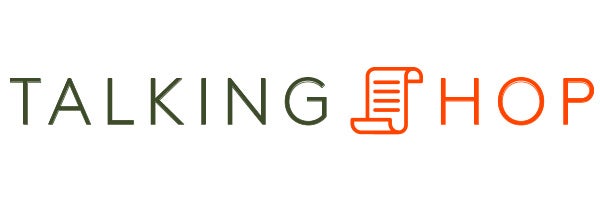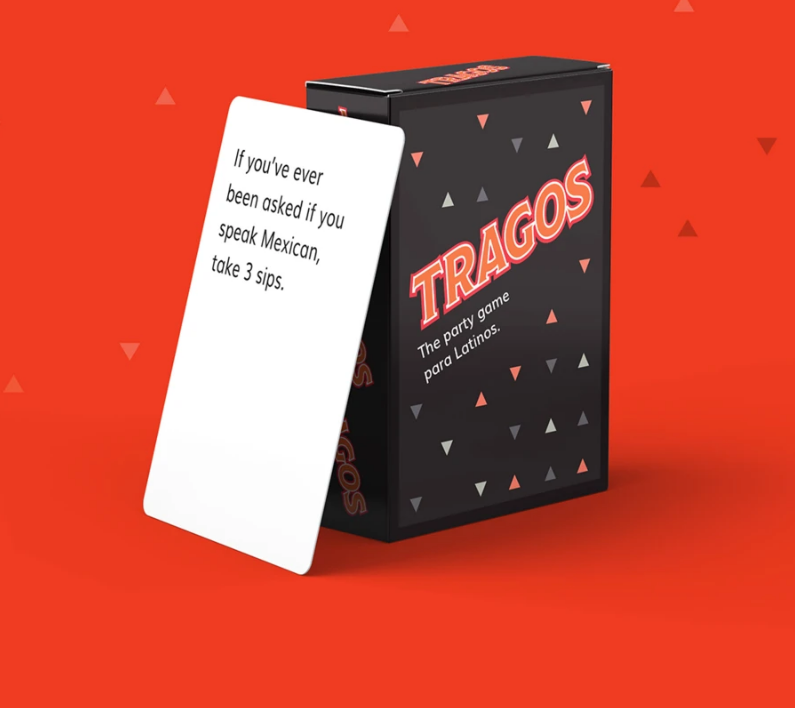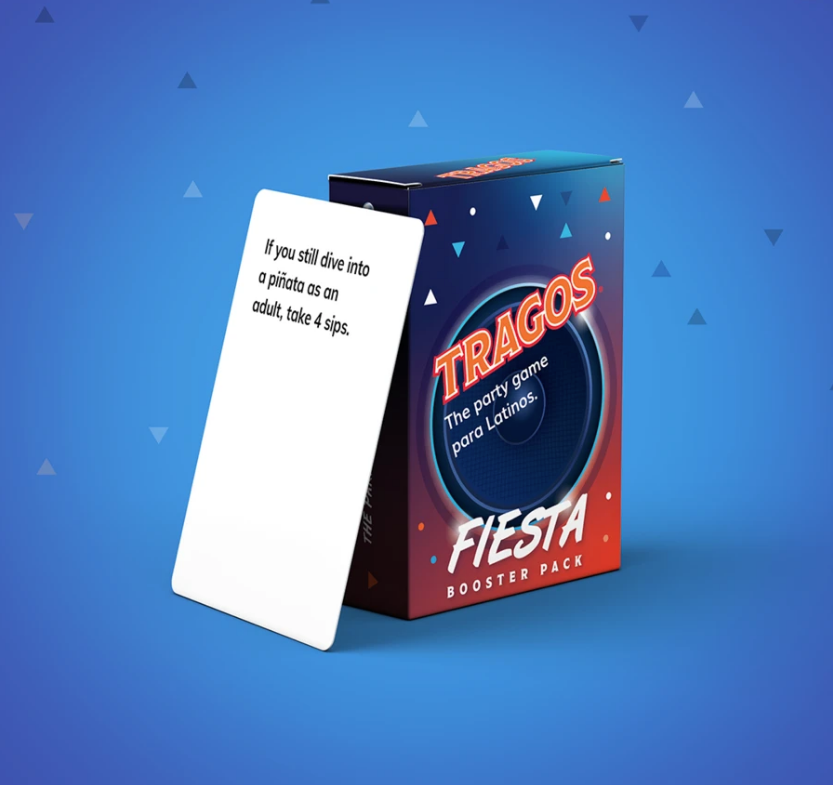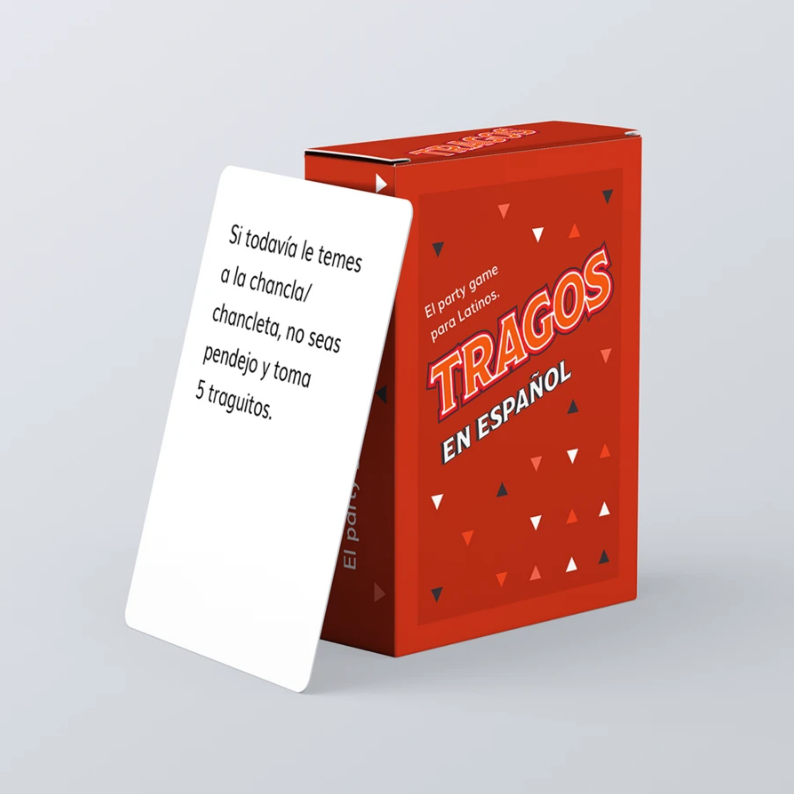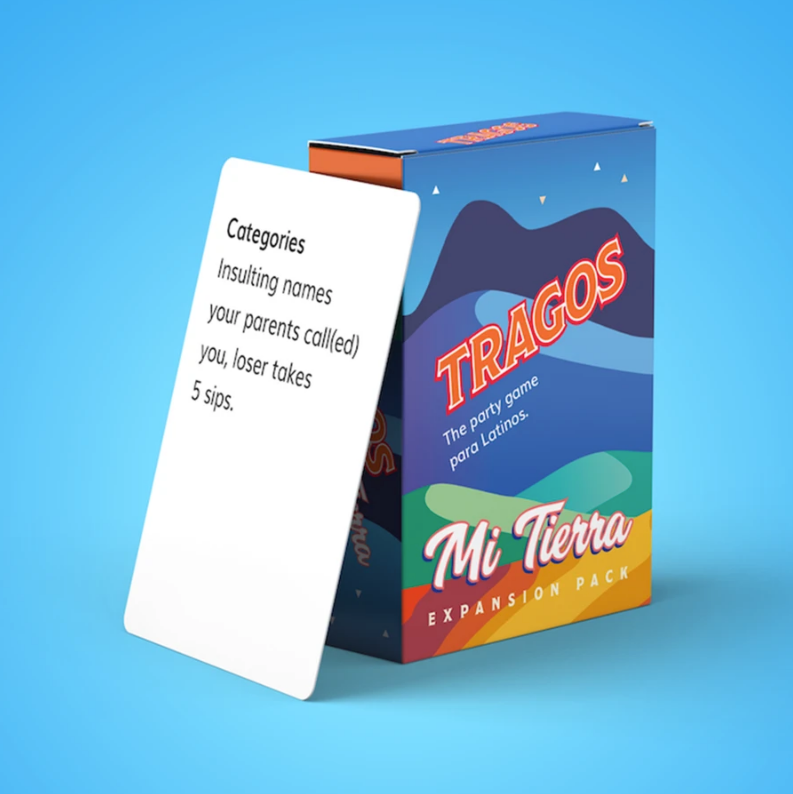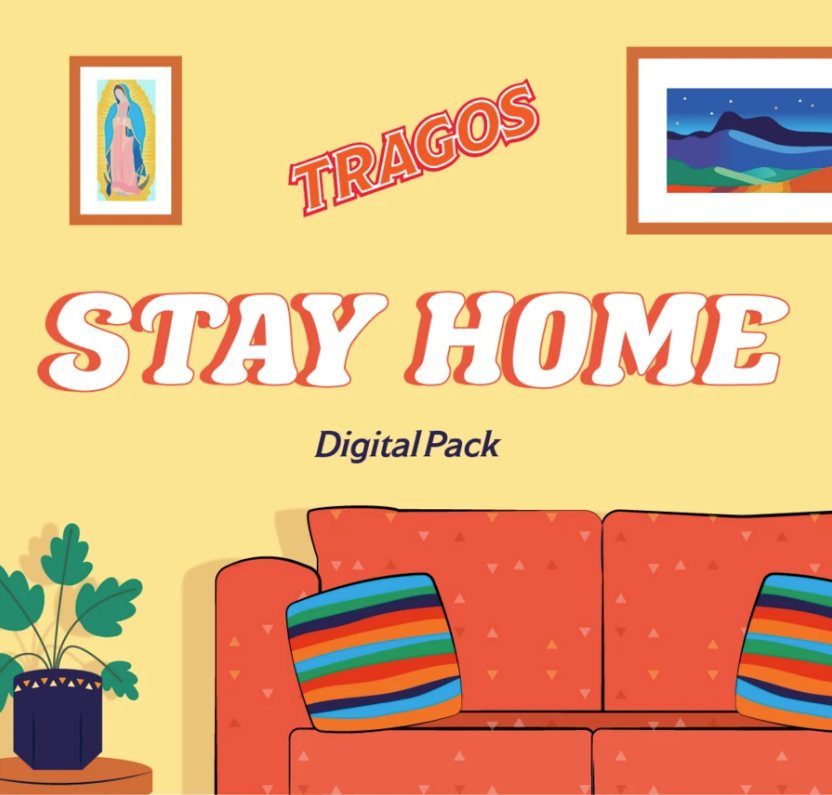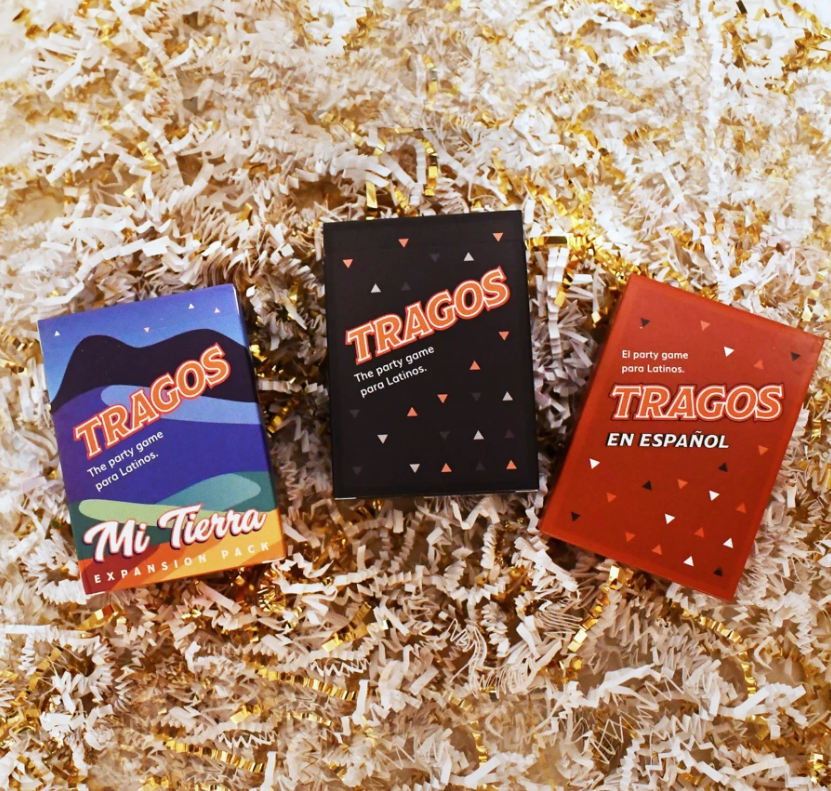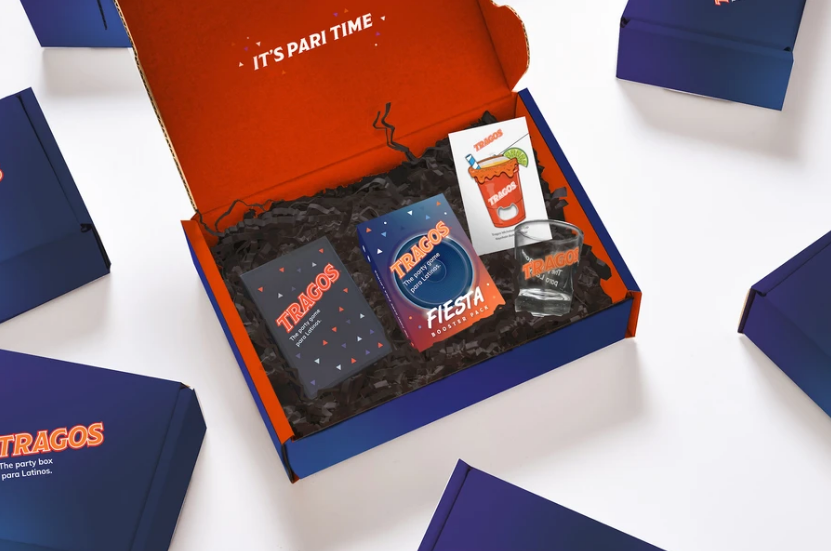We've long been speeding toward an increasingly digital world, and 2020, with all its Zoom happy hours, has only accelerated that. However, there are still a few things that unite a group — and maybe nothing more so than a tangible tabletop game. Carolina Acosta recognized that when she was 26 but noticed that her own demographic had been overlooked in this particular market. So in February 2019, she made the decision to launch Tragos, a card game line that celebrates shared Latinx cultural norms and family traditions through drinks, challenges, and laughs.
The games encourage storytelling and bonding and provide the perfect ice-breakers and fun distraction at an IRL or online party. As if that weren't appealing enough, a percentage of each unit sold by Tragos goes to charity. Since its inception, the brand has donated around $20,000 to various non-profit organizations that give back to communities in the U.S. and Latin America.
In this edition of Talking Shop, Acosta tells us all about creating a game that she wanted to play. She also shares the challenge of turning personal relationships into business ones and reveals what's next for Tragos.
The games encourage storytelling and bonding and provide the perfect ice-breakers and fun distraction at an IRL or online party. As if that weren't appealing enough, a percentage of each unit sold by Tragos goes to charity. Since its inception, the brand has donated around $20,000 to various non-profit organizations that give back to communities in the U.S. and Latin America.
In this edition of Talking Shop, Acosta tells us all about creating a game that she wanted to play. She also shares the challenge of turning personal relationships into business ones and reveals what's next for Tragos.
AdvertisementADVERTISEMENT
Refinery29: Walk me through the process of launching Tragos Games.
Carolina Acosta: The idea for Tragos actually came from a conversation I had with a colleague of mine. We had become friends by sharing this ethnic background perspective — he's Asian and I'm a Latina, but there was a large overlap there. We had this idea for a cultural drinking game, and we actually split up and came up with two sister brands, the Asian drinking game and the Hispanic drinking game. This all started off as just an experimental side hustle. I helped create the brands for both, and we launched a pre-order website on Shopify just to see if people were interested at all. We didn't even have the product ordered yet, but we did spend a little bit on advertising through social media. This was nerve-wracking because we were both freelancers so we just put the ad-spend on our credit cards and hoped for the best, but we did see some traction.
This was a game that I myself wanted to play. I love drinking games, the culturally specific element really spoke to me, and it was nothing that I had seen on the market before. I thought if I want to play then I'm sure there are other people that want to play, and that's how it went. Once we had enough pre-orders collected through our website, I went in and finally ordered the inventory using the sales that we had gathered. It was really low cost to start with, and I immediately started seeing a profit in it, so it was exciting to see it kick off. From there, it's just been growing.
It started off with maybe 10 orders a day for a few months. Then, it went viral a couple of months in, and we went from 10 orders to literally a thousand orders overnight. That was so stressful because we didn't have the inventory and we didn't have the customer support ready so we had to really escalate and get a team together. I pulled in a couple of friends to help with customer support and marketing. I had another friend take over social media, and from there, we just hit the ground running and did our best to fulfill all orders from my apartment. Now we're in a much better place, of course. Month to month, we've scaled, and we now fulfill through a proper warehouse. It's just been really exciting and fast-paced.
Carolina Acosta: The idea for Tragos actually came from a conversation I had with a colleague of mine. We had become friends by sharing this ethnic background perspective — he's Asian and I'm a Latina, but there was a large overlap there. We had this idea for a cultural drinking game, and we actually split up and came up with two sister brands, the Asian drinking game and the Hispanic drinking game. This all started off as just an experimental side hustle. I helped create the brands for both, and we launched a pre-order website on Shopify just to see if people were interested at all. We didn't even have the product ordered yet, but we did spend a little bit on advertising through social media. This was nerve-wracking because we were both freelancers so we just put the ad-spend on our credit cards and hoped for the best, but we did see some traction.
This was a game that I myself wanted to play. I love drinking games, the culturally specific element really spoke to me, and it was nothing that I had seen on the market before. I thought if I want to play then I'm sure there are other people that want to play, and that's how it went. Once we had enough pre-orders collected through our website, I went in and finally ordered the inventory using the sales that we had gathered. It was really low cost to start with, and I immediately started seeing a profit in it, so it was exciting to see it kick off. From there, it's just been growing.
It started off with maybe 10 orders a day for a few months. Then, it went viral a couple of months in, and we went from 10 orders to literally a thousand orders overnight. That was so stressful because we didn't have the inventory and we didn't have the customer support ready so we had to really escalate and get a team together. I pulled in a couple of friends to help with customer support and marketing. I had another friend take over social media, and from there, we just hit the ground running and did our best to fulfill all orders from my apartment. Now we're in a much better place, of course. Month to month, we've scaled, and we now fulfill through a proper warehouse. It's just been really exciting and fast-paced.
AdvertisementADVERTISEMENT
shop 7 products
Do you have a background in business?
All my experience is in communication design and graphic design. Before this, I spent a couple of years working for startups and working with founders themselves, watching how they scale their companies. It was a lot of FinTech, so I was surrounded by numbers in that regard, but I myself was never much of a business or finance person so this was all brand new to me.
All my experience is in communication design and graphic design. Before this, I spent a couple of years working for startups and working with founders themselves, watching how they scale their companies. It was a lot of FinTech, so I was surrounded by numbers in that regard, but I myself was never much of a business or finance person so this was all brand new to me.
It does seem like when you're working in a startup environment, you are able to see what is possible and become more open to taking risks.
Absolutely. I think it rubbed off on me without me realizing it. For a long time, I thought, Oh, starting a business looks like too much work. But I came to realize that it is definitely possible if you find something you're passionate enough about to pursue this path.
Absolutely. I think it rubbed off on me without me realizing it. For a long time, I thought, Oh, starting a business looks like too much work. But I came to realize that it is definitely possible if you find something you're passionate enough about to pursue this path.
Have you received any funding for Tragos? If so, what kind?
I'm familiar with the world of funding, but Tragos itself hasn't gone through any type of fundraising stage. We've been two years running now, and we don't need outside funding to keep moving. I have considered it for the future in case we want to scale at a more accelerated pace, but for now, we're focused on how much more we can do internally to scale the team. Once we get to a good place, we might consider some type of funding, but I do like that we are debt-free and we're still at a profit.
I'm familiar with the world of funding, but Tragos itself hasn't gone through any type of fundraising stage. We've been two years running now, and we don't need outside funding to keep moving. I have considered it for the future in case we want to scale at a more accelerated pace, but for now, we're focused on how much more we can do internally to scale the team. Once we get to a good place, we might consider some type of funding, but I do like that we are debt-free and we're still at a profit.
AdvertisementADVERTISEMENT
That's great! You mentioned that you tapped friends to help out as Tragos' demand expanded. Are those friends now full-time employees? How many employees do you have?
We do have a team. We're in the middle of that transition from contractor to employee, but the contractors I work with are basically the team and future employees. It's a group of six Latinas, and yes, they're mostly friends and they're great.
We do have a team. We're in the middle of that transition from contractor to employee, but the contractors I work with are basically the team and future employees. It's a group of six Latinas, and yes, they're mostly friends and they're great.
How did you navigate transitioning personal relationships into professional ones?
That actually has been a pretty big challenge for me because some of them are best friends, one of them is a cousin. I know they say never mixed family or friendships with business, but I think it has been an asset because I trust in the people that I selected to be part of my team. I think we've slowly developed into completely separating the two. When we talk business, we talk business, but when we talk outside of business, it's a completely different relationship. For the most part, we respect that even though, every once in a while, the lines will get blurred.
Trying to be stern or trying to act like a boss can get a little uncomfortable for me. I used to take that seriously, but actually, I've spoken to other entrepreneurs about it, especially women entrepreneurs, and they say that it's something you continue to learn so I'm not as hard on myself about it as I once was.
That actually has been a pretty big challenge for me because some of them are best friends, one of them is a cousin. I know they say never mixed family or friendships with business, but I think it has been an asset because I trust in the people that I selected to be part of my team. I think we've slowly developed into completely separating the two. When we talk business, we talk business, but when we talk outside of business, it's a completely different relationship. For the most part, we respect that even though, every once in a while, the lines will get blurred.
Trying to be stern or trying to act like a boss can get a little uncomfortable for me. I used to take that seriously, but actually, I've spoken to other entrepreneurs about it, especially women entrepreneurs, and they say that it's something you continue to learn so I'm not as hard on myself about it as I once was.
What is a small business to you?
For now, I definitely see Tragos as a small business. I would probably say what makes a small business is the reach and how much you see the business scaling from time spent in literal years. So maybe after five years, we won't consider ourselves a small business, but I also know of startups that call themselves startups after 10 years. For us, I think it will depend on how much we scale within a certain amount of time, and from the business perspective, how much revenue we can make within a year. So I would probably call Tragos a small business until we reach a financial milestone because I wouldn't want a huge team unless we grow out to be multiple businesses under one umbrella or something like that.
For now, I definitely see Tragos as a small business. I would probably say what makes a small business is the reach and how much you see the business scaling from time spent in literal years. So maybe after five years, we won't consider ourselves a small business, but I also know of startups that call themselves startups after 10 years. For us, I think it will depend on how much we scale within a certain amount of time, and from the business perspective, how much revenue we can make within a year. So I would probably call Tragos a small business until we reach a financial milestone because I wouldn't want a huge team unless we grow out to be multiple businesses under one umbrella or something like that.
AdvertisementADVERTISEMENT
What has been your biggest business challenge so far with Tragos?
There have been so many. I'd probably say it's just making the right or the most intelligent financial decisions. Because my background isn't in business, I'm always second-guessing or trying to figure out math and budgets. Of all those decisions, the one thing that I've struggled with the most is figuring out the most cost-effective way to fulfill our product. It's also something that I never thought I'd do because I always thought the world would just become even more digital. It was surprising that I set my sight on a physical product where you have to figure out how it gets made, how it gets to us, how it gets shipped to the customer. Those are all fulfillment and shipping costs, storage costs, and things like that. I'm always trying to figure out the best solution there. It's constantly changing so that we can provide better support for customers so it's still a rising challenge for me.
There have been so many. I'd probably say it's just making the right or the most intelligent financial decisions. Because my background isn't in business, I'm always second-guessing or trying to figure out math and budgets. Of all those decisions, the one thing that I've struggled with the most is figuring out the most cost-effective way to fulfill our product. It's also something that I never thought I'd do because I always thought the world would just become even more digital. It was surprising that I set my sight on a physical product where you have to figure out how it gets made, how it gets to us, how it gets shipped to the customer. Those are all fulfillment and shipping costs, storage costs, and things like that. I'm always trying to figure out the best solution there. It's constantly changing so that we can provide better support for customers so it's still a rising challenge for me.
Is that something that you've been tackling through experience or have you been coming up with strategies by talking to other businesses or through research?
All three, actually. I've spoken with other founders of physical and non-physical products. My partner who does the Asian counterpart products, we learn a lot from each other as well. A lot of it is research, but I'd say probably the majority is experience. Since I have experience in creating physical products from my graphic design background, it's easy for me to speak with suppliers and printers and understand the jargon there. From there, I take it and think about what was good about the first decision, and then once I order inventory or pick a fulfiller again, I asset what worked and what didn't. So I'm learning based on that experience.
All three, actually. I've spoken with other founders of physical and non-physical products. My partner who does the Asian counterpart products, we learn a lot from each other as well. A lot of it is research, but I'd say probably the majority is experience. Since I have experience in creating physical products from my graphic design background, it's easy for me to speak with suppliers and printers and understand the jargon there. From there, I take it and think about what was good about the first decision, and then once I order inventory or pick a fulfiller again, I asset what worked and what didn't. So I'm learning based on that experience.
AdvertisementADVERTISEMENT
What about the biggest business win?
The biggest business win so far has been the first game that we came out with. It was so unique and it spoke to so many people. It resonated with the Latino community in the U.S. so much that it just felt like, Wow, we tapped into something. It felt like discovering gold almost, so I'm very proud of that first product. Of course, we're coming out with more, and we're seeing success with those as well, but it feels like just yesterday that we came up with it and saw how well it was received.
I'd also add that as we're scaling our products and the company, I'm trying to invest a lot more in my team, and while everyone started off with strengths, I think this year we've seen so much growth with each person owning their own department. I think investing in them is also a really big business win for me because I see us accomplishing so much more even just next year.
The biggest business win so far has been the first game that we came out with. It was so unique and it spoke to so many people. It resonated with the Latino community in the U.S. so much that it just felt like, Wow, we tapped into something. It felt like discovering gold almost, so I'm very proud of that first product. Of course, we're coming out with more, and we're seeing success with those as well, but it feels like just yesterday that we came up with it and saw how well it was received.
I'd also add that as we're scaling our products and the company, I'm trying to invest a lot more in my team, and while everyone started off with strengths, I think this year we've seen so much growth with each person owning their own department. I think investing in them is also a really big business win for me because I see us accomplishing so much more even just next year.
That's so exciting! Speaking of the future, what would you say is your ultimate goal for Tragos?
I've thought about this a lot of course, and something that I was excited to do almost from the very beginning was scale our products to more than just drinking games because there's such a big industry for tabletop games, in general, that doesn't reach our market. Cultural games in general are something that we would love to keep working on.
I also want to scale to become a greater voice for Latinos because I think that there is not a whole lot of representation either in media or entertainment for our expanding community. So I'd love to do more in entertainment and become a voice either for media or creating more opportunities for Latinos. Giving back to our community is something that we position ourselves in doing so, helping make more of a difference or providing more impact for nonprofits is something we're interested in as well.
I've thought about this a lot of course, and something that I was excited to do almost from the very beginning was scale our products to more than just drinking games because there's such a big industry for tabletop games, in general, that doesn't reach our market. Cultural games in general are something that we would love to keep working on.
I also want to scale to become a greater voice for Latinos because I think that there is not a whole lot of representation either in media or entertainment for our expanding community. So I'd love to do more in entertainment and become a voice either for media or creating more opportunities for Latinos. Giving back to our community is something that we position ourselves in doing so, helping make more of a difference or providing more impact for nonprofits is something we're interested in as well.
This interview was edited for length and clarity.
AdvertisementADVERTISEMENT







